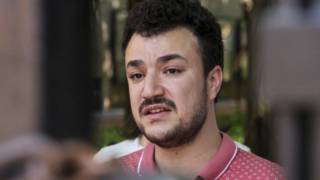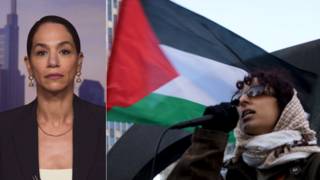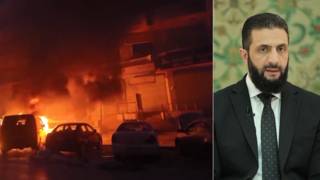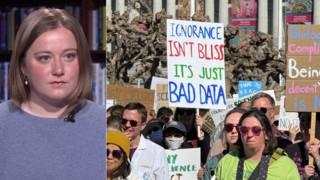HeadlinesOctober 15, 2014
WHO: Growing Ebola Infections Could Bring 10,000 New Cases per Week
The World Health Organization says nearly 9,000 people have now contracted the Ebola virus, mostly in West Africa, with a death rate of 70 percent. On Tuesday, WHO Assistant Director General Bruce Aylward estimated there could be up to 10,000 new Ebola cases per week in the coming months, up from the current 1,000.
Dr. Bruce Aylward: “It’s 8,914 cases, are the number today. We will go over 9,000 cases this week, this trend, as you can see. The number of reported deaths are 4,447 as of this morning. We anticipate the number of cases occurring per week by that time is going to be somewhere between 5,000 and 10,000 a week; it could be higher, could be lower, but it’s going to be somewhere in that ballpark.”
2nd Texas Nurse Diagnosed with Ebola; CDC Admits Slow Response
A second Texas healthcare worker has tested positive for Ebola after treating the first person diagnosed with the disease on U.S. soil. The unnamed worker follows the positive diagnosis of nurse Nina Pham, who is said to be in good condition. Both treated Thomas Eric Duncan, who died last week. The Centers for Disease Control has identified what it calls a “large group” of other workers involved in Duncan’s care who may be at risk. The nation’s largest nurses union, National Nurses United, has accused hospitals of failing to protect workers from the virus. On Tuesday, the CDC acknowledged it should have acted faster to respond to the Duncan case, saying it might have prevented the workers’ infections. CDC Director Thomas Frieden also announced the establishment of new units to respond to Ebola cases.
Dr. Thomas Frieden: “The second thing that we will be doing, starting today, is establishing a CDC Ebola response team. For any hospital anywhere in the country that has a confirmed case of Ebola, we will put a team on the ground, within hours, with some of the world’s leading experts in how to take care of and protect healthcare workers from Ebola infection.”
U.N.: ISIS Advance Displaces over 180,000 from Iraqi Town of Heet
The United Nations continues to warn of a worsening crisis for Iraqi civilians displaced by ISIS advances in Iraq. On Tuesday, a spokesperson for the Office for the Coordination of Humanitarian Affairs said more than 180,000 people have fled the town of Heet.
Melissa Fleming: “After the capture of Heet by ISIS and affiliated armed groups over the weekend, we estimate that 180,000 people have fled from that town. This is located just 180 kilometers from Baghdad. The city’s residents are mostly Sunni, but it also was home to or refuge to a large number of displaced people, who fled there from other parts of Anbar province before. It is an absolute tragedy to see these people uprooted and the Iraq that was once home to such a rich variety of peoples being segregated and pushed away and lumped together.”
Obama Talks “Long-Term Campaign” with Defense Chiefs from Anti-ISIS Coalition
On Tuesday, President Obama met with the defense ministers from more than 20 governments involved in the U.S.-led campaign against the Islamic State. Speaking at the Andrews Air Force Base, Obama said the offensive against ISIS will be a long one.
President Obama: “One of the things that has emerged from the discussions, both before I came and during my visit here, is that this is going to be a long-term campaign. There are not quick fixes involved. We’re still at the early stages. As with any military effort, there will be days of progress and there are going to be periods of setback, but our coalition is united behind this long-term effort.”
White House Walks Back Claim of Agreement on Turkey Bases
The Obama administration says it continues to hold talks with Turkey on hosting U.S.-led troops for the fight against the Islamic State. National Security Adviser Susan Rice had said Turkey would provide its military bases, a claim the Turkish government then denied. At the White House, Press Secretary Josh Earnest said the talks are ongoing.
Josh Earnest: “This issue of military bases in Turkey is an issue that continues to be discussed between American officials and Turkish officials.”
Reporter: “So at this point, there is no formal agreement on that front?”
Josh Earnest: “Well, I think that might obvious from the public comments from both sides. But this is something that we continue to discuss with them.”
The Obama administration has pressured Turkey to take a more active role against ISIS, while Turkey has requested a buffer zone along its border with Syria. The dispute comes as Turkish warplanes have bombed one of the main groups fighting ISIS, the Kurdish Workers’ Party, or PKK. The Turkish military says it acted in retaliation to PKK attacks. The strikes are the first by Turkey against the PKK since a truce reached in 2012.
Texas Abortion Clinics to Remain Open After Supreme Court Overturns Anti-Choice Measures
The Supreme Court has overturned key anti-choice restrictions that have gutted abortion access in Texas. A decision by a federal appeals court this month allowed hospital-style building requirements to go into effect, shuttering all but eight abortion facilities in a state that previously had more than 40. Abortion providers reported a massive spike in phone calls and wait times for abortion, as women in large parts of the state were faced with long travel times to the nearest provider. According to advocates, Tuesday’s ruling means at least 13 clinics will be able to reopen today. But the move is only temporary as the initial federal court ruling is appealed. In a statement, the Center for Reproductive Rights said: “This fight against Texas’ sham abortion law is not over.”
Appeals Court Restores Texas Voter ID Law for November Election
A federal appeals court has restored Texas’ controversial voter ID law just days after it was struck down. A federal judge overturned the law last week, calling it an “unconstitutional poll tax” that discriminates against voters of color. But on Tuesday, a three-judge panel said Texas can enforce the ID law in the November election, because dropping it would cause confusion. The panel did not rule on whether the law should permanently stand.
Hong Kong Police Make Largest Number of Arrests Since Protests Began
In Hong Kong, police in riot gear have launched a crackdown on pro-democracy activists who have been protesting for weeks to demand greater political freedom. Police used pepper spray and batons, arresting 45 people. The protests have been further galvanized by video footage from a local TV broadcaster that shows a group of plainclothes police dragging a man behind a building, then beating and kicking him. Hong Kong’s security chief says the officers have been “temporarily removed from current duties.” Protesters are vowing to defy the crackdown and continue their call for free elections without intervention from China.
Nigerian Protesters Mark Six Months Since Schoolgirls’ Kidnapping
In Nigeria, demonstrators are marking six months since the kidnapping of more than 200 schoolgirls by the Boko Haram. On Tuesday, dozens of people with the “Bring Back Our Girls” campaign rallied in the capital Abuja.
Veronica Caamba: “We, as civil citizens, had written the president a week ago, notifying him that we were coming to see him to inquire why our girls are not yet back. It is no longer about updates on what is going on, which we never get anyway. We are here today to demand the immediate and urgent return of our girls. We are angry Nigerians. It’s taken too long. It’s 183 days today, six months.”
U.S. Military Contractor Killed, Another Wounded in Saudi Arabia Shooting
An American military contractor has been killed and another wounded in a shooting in the Saudi Arabian capital of Riyadh. The two are employees of a subsidiary of the Virginia-based contracting giant Northrop Grumman. The Saudi government says it has arrested a suspect who formerly worked with the two victims. In Washington, State Department spokesperson Jen Psaki said the United States has issued a security advisory to Americans in Saudi Arabia.
Jen Psaki: “Obviously, we evaluate our security posture when incidents occur. Certainly, we’re in the process of evaluating our security posture. We’ll take appropriate steps to ensure that all of U.S. mission personnel are safe, of course. We typically issue — our embassy is issuing, I should say, a security message to U.S. citizens to advise them on the situation and any safety precautions.”
Report: U.S. Hid Injuries of Soldiers Wounded by Western-Supplied Chemical Weapons in Iraq
A new report says the Bush administration concealed the discovery of chemical weapons in Iraq that had been developed with U.S. support in the 1980s — and then denied medical care to the wounded American soldiers involved. According to The New York Times, U.S. troops secretly reported finding more than 5,000 chemical warheads, shells or bombs after the 2003 invasion. All of the chemical weaponry predated 1991, just one year after Saddam Hussein stopped being a U.S. ally and recipient of the Western military aid that helped build his arsenal. At least 17 American and six Iraqi troops were wounded in their handling of the munitions in six separate incidents between 2004 and 2011. The weapons’ existence was kept from the troops entering those areas, and officials denied the victims the care they needed. One soldier talked about his health problems as a result of chemical exposure.
Andrew Goldman: “I still have residual blisters every now and then. I still have a lot of trouble breathing. I have a constant headache. I haven’t not had a headache since 2008 … Only thing I can think of is politics. Doesn’t jive with the story they wanted.”
In addition to raising new questions about the neglect of soldiers’ health and the Bush administration’s false pretext for going to war, the disclosure also carries implications for Iraq’s ongoing crisis. The Islamic State now controls most of the territory where the chemical weapons were found.
Police: Ballistic Evidence Implicates St. Louis Man Shot Dead by Officer
In Missouri, police say ballistic evidence shows a man fatally shot by police last week opened fire first. An off-duty officer killed 18-year-old Vonderitt Myers after approaching a group Myers was standing with on the street. Myers’ family has insisted he was unarmed, holding only a sandwich he had bought moments before. But the Missouri Highway Patrol says new residue tests and ballistic evidence support the officer’s claim that Myers fired at least three times before the officer shot back. Myers’ killing has sparked new protests as demonstrators continue to rally for justice two months after the police shooting of unarmed black teen Michael Brown.
Chicago Teachers Union President Has Brain Tumor, Won’t Pursue Mayoral Bid
A top labor leader and champion for public education in Chicago has been diagnosed with a cancerous brain tumor. Karen Lewis, the president of the Chicago Teachers Union, has led the struggle against school closures and privatization in Chicago, culminating in a teachers’ strike that made national headlines two years ago. Her medical condition will prevent her from running against Chicago Mayor Rahm Emanuel in next year’s election, a move she had been strongly considering. A recent poll had placed Lewis ahead of Emanuel by nine points. In a statement, a spokesperson said: “Karen Lewis has decided to not pursue a mayoral bid. Yet she charges us to continue fighting for strong neighborhood schools, safe communities and good jobs for everyone.”
Most popular
- 1
- 2
- 3
- 4
Non-commercial news needs your support
Please do your part today.











Media Options